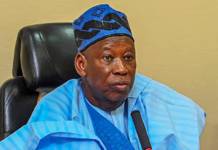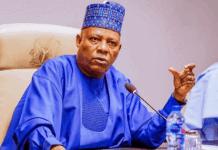President of the Senate, Senator Ahmad Lawan, and the Speaker of the House of Representatives, Rt. Hon. Femi Gbajabiamila, on Monday evening met with the Minister of Finance, Hajiya Zainab Ahmed, over the 2022-2024 Medium Term Expenditure Framework and Fiscal Strategy Paper.
The meeting which started at 5:11pm lasted till about 7:15pm and had in attendance the Deputy Senate President, Ovie Omo-Agege, the Deputy Speaker, Ahmed Idris Wase and some other principal officers of both chambers, as well as Senators and Members of the House of Representatives.
According to the Senate President, the meeting was convened at the instance of the leadership of the National Assembly to deliberate on projections in the 2022-2024 MTEF/FSP needed to facilitate the early presentation of the 2022 budget by President Muhammadu Buhari in September this year.
Lawan in his welcome address recalled the commitment of the Ninth National Assembly towards the early passage of the nation’s annual budget.
He explained that the development was responsible for the 100 percent implementation of the 2020 Appropriations Act which, according to him, would be achieved also in 2021.
The Senate President added that the interaction between the National Assembly and the Ministry of Finance on the 2022-2024 Medium Term Expenditure Framework would facilitate the early presentation of the 2022 Appropriations Bill in September this year.
He said, “We all recall how this Ninth National Assembly committed itself Ab initio to ensuring the passage of the Appropriations before the end of December of every year, to enable the implementation of the Appropriations Act to start January of every year.
“So far, we have achieved that in the 2020 budget and 2021 budget as well. This has significantly improved the implementation of the Appropriations Act, culminating in the 100 percent implementation of the 2020 budget, and we are optimistic that the implementation of the 2021 budget would also achieve 100 percent.
“The 2022 Appropriations Bill would be predicated on the MTEF/FSP 2022-2024. [And] it is very important that this interaction takes place so that the National Assembly is able to consider the MTEF in very good time to allow the Executive arm of government prepare the Appropriations Bill for 2022.”
Speaking, the Minister of Finance, Hajiya Zainab Ahmed, recalled that Nigeria was able to make a quick exit from recession in the third quarter of 2020 despite the impact of the COVID-19 pandemic on the global economy.
According to her, this had an attendant “negative growth” on the Nigerian economy as a result of the significant and sudden drop in crude oil price in the international market.
The Finance Minister disclosed that although the Nigerian economy experienced more revenue earnings in 2020 from non-oil sectors, other sectors such as transport still remain in the negative.
“The economy since then has sustained a tepid growth in the first quarter of 2021, with a growth of 0.51 percent consolidating our exit from recession in the fourth quarter.
“The growth of the Nigeria economy, we are pleased to say, is driven largely by the non-oil sector, which has risen to 0.79 percent, masking the deterioration in the oil sector.
“The sectoral growth in the non-oil sector was primarily driven by telecoms and agriculture sectors as well as other sectors of the Nigerian economy.
“Significant concerns still exist in the performance of trade, as well as transport sector which are still in a very strong negative growth”, she said.

























